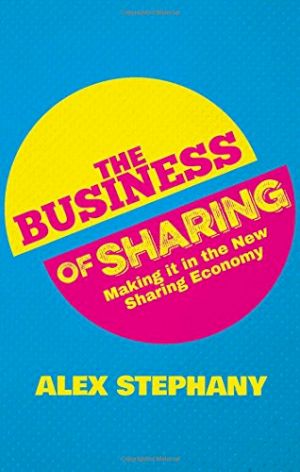24 June 2015
The Business of Sharing: Making it in the New Sharing Economy
Alex Stephany
2015, Palgrave Macmillan, 226 pages, £16.99
ISBN 9781137376176
Reviewer: Helen Solomon, Lecturer in Economics, De Montfort University

The Business of Sharing is an informative and entertaining account about how ordinary people are profiting through sharing their assets. People are sharing assets such as bedrooms and apartments, cars, parking spaces, clothes, general services and even pets dogs! Research by PricewaterhouseCoopers estimates this business to be worth of $15 billion a year and is a growing movement. This movement described as the sharing economy is defined by the author as “the value in taking underutilized assets and making them accessible online to a community, leading to a reduced need for ownership of these assets.” According to the author, the shared economy is not a new phenomenon but can be traced back to before World War II when it was literally a way of life. In summary, this book provides a compelling account into how sharing is changing people’s lives through the power of technology. It describes how sharing provides a corridor for people to transform unused assets into cash and in return join an online network of people with shared interests. For example, people choose to rent rooms through Airbnb not just because it’s cheaper but also because it provides an authentic human experience of sharing someone’s home.
The book is structured into six chapters and describes the evolution of the shared economy. Chapter 1 describes how the sharing economy works and why sharing is good business. Chapter 2 drives home the point that the sharing economy is transforming us into “prosumers”, or “producers and consumers who create value at the same time as getting what we want from those around us.” Chapters 3 and 4 use real life examples to show how people have developed the notion of sharing into a profitable business enterprise. It is also attracting huge investment from venture capitalists because it is a growing market place.
Chapters 5 and 6 discuss the implications of the sharing economy for corporations and governments. The sharing economy has the ability to act as a disruptive force to industries. If industries are not able to evolve with the technology then it has the ability to shift demand away from well-established brands such as in the music, car and transportation industries respectively. Governments also face a Catch 22 in attempting to regulate the sharing economy. If governments regulate, then they risk stifling entrepreneurship, innovation and potentially future economic growth but if they do not regulate then there is potential for exploitation which puts ordinary people at risk. Uber, a car sharing service, highlights well the challenge of balancing innovation and regulation.
The sharing economy is really about taking capitalism to the masses but there will of course be losers as well as winners. The book compels you to consider whether the sharing economy is signalling a new economic phase. In this case, we need to discover new ways of measuring its impact on economic activity. On the other hand, is it simply the latest fad? A consequence of sharing is reduced ownership, but if we share to the point that we don’t own anything then what is the incentive to share?
